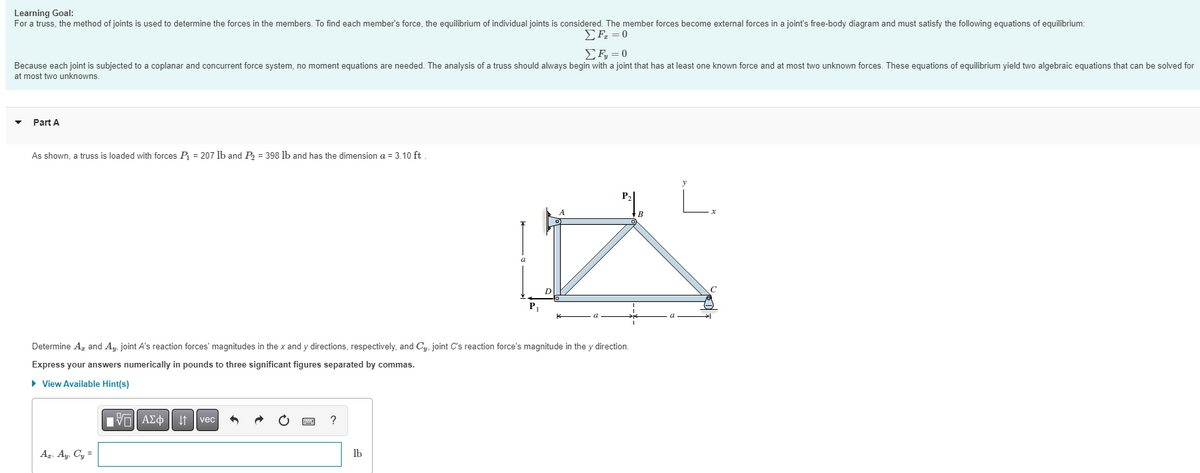As shown, a truss is loaded with forces P=207 lb and P = 398 lb and has the dimension a 3.10 ft. Determine A, and Ay, joint A's reaction forces' magnitudes in the x and y directions, respectively, and Cy. joint C's reaction force's magnitude in the y direction. Express your answers numerically pounds to three significant figures separated by commas. ▸ View Available Hint(s) Az. Ay. Cy IVE ΑΣΦ | 11 | νεο → C lb L.
As shown, a truss is loaded with forces P=207 lb and P = 398 lb and has the dimension a 3.10 ft. Determine A, and Ay, joint A's reaction forces' magnitudes in the x and y directions, respectively, and Cy. joint C's reaction force's magnitude in the y direction. Express your answers numerically pounds to three significant figures separated by commas. ▸ View Available Hint(s) Az. Ay. Cy IVE ΑΣΦ | 11 | νεο → C lb L.
Chapter2: Loads On Structures
Section: Chapter Questions
Problem 1P
Related questions
Question

Transcribed Image Text:Learning Goal:
For a truss, the method of joints is used to determine the forces in the members. To find each member's force, the equilibrium of individual joints is considered. The member forces become external forces in a joint's free-body diagram and must satisfy the following equations of equilibrium:
Σ F = 0
Σ F = 0
Because each joint is subjected to a coplanar and concurrent force system, no moment equations are needed. The analysis of a truss should always begin with a joint that has at least one known force and at most two unknown forces. These equations of equilibrium yield two algebraic equations that can be solved for
at most two unknowns.
Part A
As shown, a truss is loaded with forces P₁ = 207 lb and P₂ = 398 lb and has the dimension a = 3.10 ft.
AT, Ay, Cy=
Determine A, and Ay, joint A's reaction forces' magnitudes in the x and y directions, respectively, and Cy, joint C's reaction force's magnitude in the y direction.
Express your answers numerically in pounds to three significant figures separated by commas.
► View Available Hint(s)
VAΣo↓↑vec
?
P₁
lb
P₁₂
B
C
Expert Solution
This question has been solved!
Explore an expertly crafted, step-by-step solution for a thorough understanding of key concepts.
This is a popular solution!
Trending now
This is a popular solution!
Step by step
Solved in 2 steps with 2 images

Knowledge Booster
Learn more about
Need a deep-dive on the concept behind this application? Look no further. Learn more about this topic, civil-engineering and related others by exploring similar questions and additional content below.Recommended textbooks for you


Structural Analysis (10th Edition)
Civil Engineering
ISBN:
9780134610672
Author:
Russell C. Hibbeler
Publisher:
PEARSON

Principles of Foundation Engineering (MindTap Cou…
Civil Engineering
ISBN:
9781337705028
Author:
Braja M. Das, Nagaratnam Sivakugan
Publisher:
Cengage Learning


Structural Analysis (10th Edition)
Civil Engineering
ISBN:
9780134610672
Author:
Russell C. Hibbeler
Publisher:
PEARSON

Principles of Foundation Engineering (MindTap Cou…
Civil Engineering
ISBN:
9781337705028
Author:
Braja M. Das, Nagaratnam Sivakugan
Publisher:
Cengage Learning

Fundamentals of Structural Analysis
Civil Engineering
ISBN:
9780073398006
Author:
Kenneth M. Leet Emeritus, Chia-Ming Uang, Joel Lanning
Publisher:
McGraw-Hill Education


Traffic and Highway Engineering
Civil Engineering
ISBN:
9781305156241
Author:
Garber, Nicholas J.
Publisher:
Cengage Learning